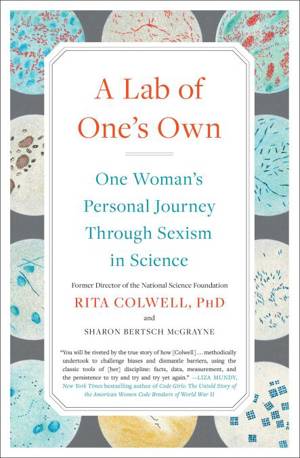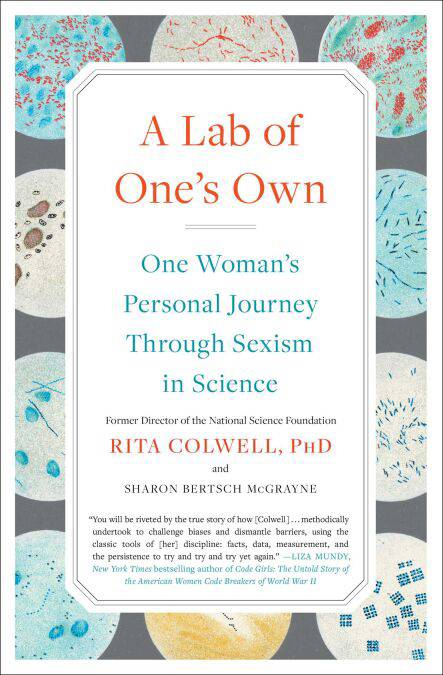
- Afhalen na 1 uur in een winkel met voorraad
- Gratis thuislevering in België vanaf € 30
- Ruim aanbod met 7 miljoen producten
- Afhalen na 1 uur in een winkel met voorraad
- Gratis thuislevering in België vanaf € 30
- Ruim aanbod met 7 miljoen producten
Zoeken
A Lab of One's Own E-BOOK
One Woman's Personal Journey Through Sexism in Science
Rita Colwell, Sharon Bertsch McGrayne
E-book | Engels
€ 3,34
+ 3 punten
Uitvoering
Omschrijving
A “beautifully written” (Kirkus Reviews, starred review) memoir-manifesto from the first female director of the National Science Foundation about the entrenched sexism in science, the elaborate detours women have take to bypass the problem, and how to fix the system.
If you think sexism thrives only on Wall Street or Hollywood, you haven’t visited a lab, a science department, a research foundation, or a biotech firm.
Rita Colwell is one of the top scientists in America: the groundbreaking microbiologist who discovered how cholera survives between epidemics and the former head of the National Science Foundation. But when she first applied for a graduate fellowship in bacteriology, she was told, “We don’t waste fellowships on women.” A lack of support from some male superiors would lead her to change her area of study six times before completing her PhD.
A Lab of One’s Own is an “engaging” (Booklist) book that documents all Colwell has seen and heard over her six decades in science, from sexual harassment in the lab to obscure systems blocking women from leading professional organizations or publishing their work. Along the way, she encounters other women pushing back against the status quo, including a group at MIT who revolt when they discover their labs are a fraction of the size of their male colleagues.
Resistance gave female scientists special gifts: forced to change specialties so many times, they came to see things in a more interdisciplinary way, which turned out to be key to making new discoveries in the 20th and 21st centuries. Colwell would also witness the advances that could be made when men and women worked together—often under her direction, such as when she headed a team that helped to uncover the source of anthrax used in the 2001 letter attacks.
A Lab of One’s Own is “an inspiring read for women embarking on a career or experiencing career challenges” (Library Journal, starred review) that shares the sheer joy a scientist feels when moving toward a breakthrough, and the thrill of uncovering a whole new generation of female pioneers. It is the science book for the #MeToo era, offering an astute diagnosis of how to fix the problem of sexism in science—and a celebration of women pushing back.
If you think sexism thrives only on Wall Street or Hollywood, you haven’t visited a lab, a science department, a research foundation, or a biotech firm.
Rita Colwell is one of the top scientists in America: the groundbreaking microbiologist who discovered how cholera survives between epidemics and the former head of the National Science Foundation. But when she first applied for a graduate fellowship in bacteriology, she was told, “We don’t waste fellowships on women.” A lack of support from some male superiors would lead her to change her area of study six times before completing her PhD.
A Lab of One’s Own is an “engaging” (Booklist) book that documents all Colwell has seen and heard over her six decades in science, from sexual harassment in the lab to obscure systems blocking women from leading professional organizations or publishing their work. Along the way, she encounters other women pushing back against the status quo, including a group at MIT who revolt when they discover their labs are a fraction of the size of their male colleagues.
Resistance gave female scientists special gifts: forced to change specialties so many times, they came to see things in a more interdisciplinary way, which turned out to be key to making new discoveries in the 20th and 21st centuries. Colwell would also witness the advances that could be made when men and women worked together—often under her direction, such as when she headed a team that helped to uncover the source of anthrax used in the 2001 letter attacks.
A Lab of One’s Own is “an inspiring read for women embarking on a career or experiencing career challenges” (Library Journal, starred review) that shares the sheer joy a scientist feels when moving toward a breakthrough, and the thrill of uncovering a whole new generation of female pioneers. It is the science book for the #MeToo era, offering an astute diagnosis of how to fix the problem of sexism in science—and a celebration of women pushing back.
Specificaties
Betrokkenen
- Auteur(s):
- Uitgeverij:
Inhoud
- Aantal bladzijden:
- 288
- Taal:
- Engels
Eigenschappen
- Productcode (EAN):
- 9781501181283
- Verschijningsdatum:
- 3/08/2020
- Uitvoering:
- E-book
- Beveiligd met:
- Adobe DRM
- Formaat:
- ePub

Alleen bij Standaard Boekhandel
+ 3 punten op je klantenkaart van Standaard Boekhandel
Beoordelingen
We publiceren alleen reviews die voldoen aan de voorwaarden voor reviews. Bekijk onze voorwaarden voor reviews.











